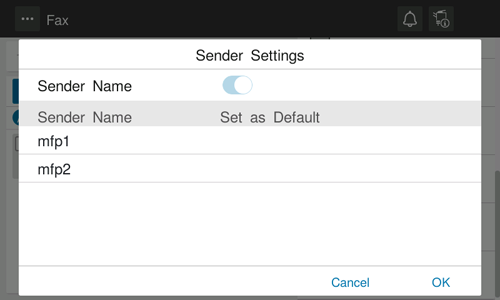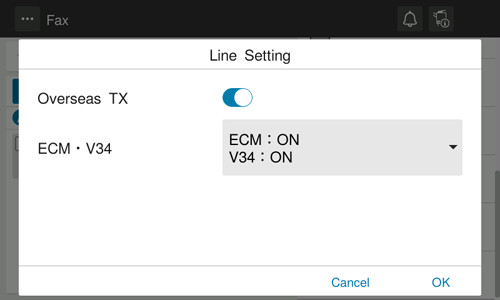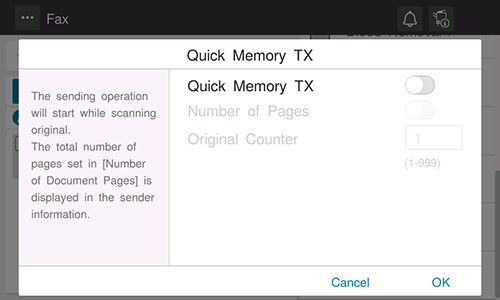
Fax-Specific Settings
Sending after renaming the sender ([Sender Settings])
Normally, the default sender name is added. However, you can use different sender names as necessary.
If you want to use a sender name that is different from the default name, select a sender name you want to change to, and tap [OK].

Setting a fax line type ([Line Setting])
Specify how to send a fax based on the line conditions.

Setting | Description |
|---|---|
[Overseas TX] | This mode is used to send a fax to areas where communication conditions are poor. Faxes are sent at a lower speed. |
[ECM V34] | ECM is an error correction mode defined by ITU-T (International Telecommunication Union - Telecommunication Standardization Sector). Fax machines equipped with the ECM feature communicate with each other, confirming that the sent data is free of errors. This prevents image blurring caused by telephone line noise. Communication time can be reduced by setting ECM to OFF for transmission. However, an image error or communication error may occur depending on the specified communication time value, so change the value to suit conditions. V.34 is a communication mode used for the Super G3 fax communication. When the remote machine or this machine is connected to a telephone line via PBX, however, you may not establish a communication in the super G3 mode depending on telephone line conditions. In this case, it is recommended that you turn the V.34 mode off to send data. |
Sending one scanned page at a time ([Quick Memory TX])
As one page is scanned, fax transmission starts. Generally, transmission begins after all pages have been scanned and saved in memory (Memory TX). With Quick Memory TX, many pages can be faxed without causing memory overflow.
If you want to show the total number of pages in the Number of Pages column of sender information, set [Number of Pages] to ON, and enter the total number of pages of the original in [Original Counter]. With this information, the destination can see the remaining number of pages to be received.


 in the upper-right of a page, it turns into
in the upper-right of a page, it turns into  and is registered as a bookmark.
and is registered as a bookmark.